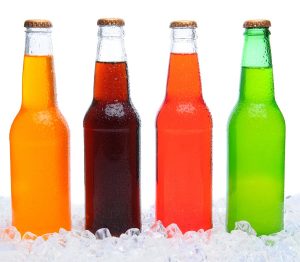Is it possible for a “clean” protein source to work against your muscle-gaining goals and harbor toxic chemicals and artificial sweeteners? The answer may terrify personal trainers and their clients; the details are quite disturbing.
Numerous protein supplements available to serious athletes today contain artificial sweeteners such as sucralose (marketed as Splenda) and aspartame. These include pre- and post-workout products, protein powders, and even many protein bar varieties.
While we might feel justified in saving the calories that real sugar adds to foods, there lurks a dangerous and hidden truth within the science of sugar substitutes. As it turns out, upon ingestion, many of these sweetening compounds break down into neurotoxic poisons.
Artifical Sweeteners Hazardous To Our Health?
Sucralose is a perfect example. This compound is sucrose (simple table sugar) which has been chemically altered by the substitution of three chlorine atoms for three hydroxyl groups naturally present in sucrose. Chlorine is a known carcinogen, used in many common cleaning products; it is not, nor has it even been, considered safe for internal use. Scientists studying the efficacy of such chemical manipulation have found some prominent health risks associated with the consumption of sucralose:
- Disruption of the endocrine (hormonal) system
- Development of toxic buildup in the body, most notably in the brain
- Unhealthy weight gain and cancer
- Damage to the “good” bacteria within the gut
Chemicals such as chlorine remain in the body and accumulate over time. According to the Sucralose Toxicity Information Center, once sucralose and its by-products are ingested, the absorbed substances tend to concentrate in the liver, kidney, and gastrointestinal tract. The FDA claims that there is only 11 to 27 percent absorption of the toxic chemicals after ingestion. However, an independent study conducted by the Japanese Food Sanitation Council showed that as much as 40 percent is absorbed, and therefore stored, by the body.

Irritated Intestines
A 20-year study conducted in Alberta, Canada revealed that individuals consuming products containing sucralose exhibited a higher incidence of ulcerative colitis, Crohn’s disease, and irritable bowel syndrome (IBS). Simply stated, our bodies have not evolved to recognize this chemical, artificial sweetener, and are therefore unable to digest or process it, rendering it the culprit in damaging not only the intestinal lining but also unbalancing the gut’s natural flora.
User Error Or Poorly-Informed Public?
James Turner, Chairman of the National Consumer Education Group Citizens for Health, expressed shock and outrage after reading a new report from scientists outlining the dangers of the artificial sweetener Splenda (sucralose). We, as consumers and trusting public citizens, have been grossly misled. Rather than functioning as a diet aid, these sugar substitute products have the potential to significantly disrupt the biochemistry of the human brain, reducing our ability for calorie control. It has been demonstrated that sugar-free sodas can actually double one’s risk of obesity by stimulating appetite, and carbohydrate cravings in particular.

Calorie-Free Calamity
Almost if not all testing on artificial sweeteners has taken place utilizing an animal model rather than a human one. Upon examination of the animal subjects in one such study, Sucralose (Splenda) appeared to have reduced the amount of good bacteria in the animals’ intestines by 50 percent, increased the pH level in the intestines, and contributed to increases in body weight. Splenda consumption also affects a substance in the body known as P-glycoprotein (P-gp).
As the levels of P-gp were observed, it soon became apparent that Sucralose could have a detrimental affect on how certain crucial health-related drugs are processed in the human body.
When exposed to higher concentrations of Splenda and its by-products, many medications have the potential to be rejected by the very humans who require them to sustain daily life. The P-gp effect could result in medications used in chemotherapy, AIDS treatment, and heart conditions being shunted back into the intestines, rendering them ineffective, rather than successfully being absorbed by the body.
The truly frightening reality in this scenario is that we most likely have no idea that this is occurring as we enjoy our refreshing, calorie-free beverage.
According to Turner, “The report makes it clear that the artificial sweetener Splenda and its key component sucralose pose a threat to the people who consume the product. Hundreds of consumers have complained to us about side effects from using Splenda and this study… confirms that the chemicals in the little yellow package should carry a big red warning label.”
Furthermore, the lure of calorie-free seems to have worn out its welcome. Many studies point to higher risk of obesity linked to consumption of artificial sweeteners.
Focus Like an Airline Pilot
Another target under investigation is the artificial sweetener commonly known as Aspartame. This compound is often found in sugar-free beverages. Chemically speaking, Aspartame is composed of two amino acids with the addition of methanol. Upon ingestion, methanol breaks down into formaldehyde and formic acid. Both are naturally present in the body in low and manageable levels; but a small additional amount is all it takes for formaldehyde to begin exerting its toxic effects.
A publication distributed by the United States Air Force warned U.S. Air Force pilots not to consume Aspartame in any amounts. It has been purported, upon investigation, to be a possible cause of brain tumors, epilepsy, fibromyalgia, Parkinson’s disease, deleterious changes in gut health, autoimmune disorders and even diabetes.
Toxic Effects of Artificial Sweeteners
How can we recognize a toxic build-up of such artificial sweeteners in our bodies? The following is a list of the most common manifestations of which to be aware:
• Extra weight in the belly area
• Bloating
• Skin irritations/itching
• Swollen hands and feet
• Occasional headaches
• Joint stiffness
• Clouded/unclear thinking
Weighing In On The Whey Options
While this startling news might be of interest to clients who are trying to cut calories and minimize overall sugar intake, another category of frequent gym-goers is also at risk. Bodybuilders who supplement their rigorous workouts with the addition of protein powders and bars will want to sit up and take notice of the myriad products on the market today that include deleterious artificial sweeteners.
Almost every major supplement company’s whey protein powder products list one or more of these dangerous sugar substitutes on the package label. We may think we are doing our bodies a favor by fueling them post-workout with a hefty dose of “clean” protein in an effort to maintain and maximize lean muscle mass; however, in reality, we are in fact slowly poisoning them. It does not take much to tip the scales in favor of toxicity; our healthy lifestyle soon becomes tainted, which is the ultimate antithesis of why many of us spend hours in the gym.
Ingest Intelligently
It is not the intention of this article to suggest a consumer utilizes one certain brand of protein supplement over another. Rather it is to open the eyes of those who blindly assume that the ingestion of artificial sweeteners is a safer and healthier alternative to sugar. It would appear as if the government and its regulatory factions are not going to protect us on this front. We must become well-informed, and advocate for ourselves.
References
1. http://proxformulas.com/the-dangers-of-artificial-sweeteners-in-most-protein-powders/
2. http://proxformulas.com/hidden-dangers-sucralose/
3. https://www.downtoearth.org/articles/2009-03/68/sucralose-dangerous-sugar-substitute
4. http://articles.mercola.com/sites/articles/archive/2009/02/10/new-study-of-splenda-reveals-shocking-information-about-potential-harmful-effects.aspx
5. https://www.ncbi.nlm.nih.gov/pubmed/24219506
6. http://www.globalhealingcenter.com/natural-health/two-of-the-most-dangerous-artificial-sweeteners/
7.
Cathleen Kronemer is an NFPT CEC writer and a member of the NFPT Certification Council Board. Cathleen is an AFAA-Certified Group Exercise Instructor, NSCA-Certified Personal Trainer, ACE-Certified Health Coach, former competitive bodybuilder and freelance writer. She is employed at the Jewish Community Center in St. Louis, MO. Cathleen has been involved in the fitness industry for over three decades. Feel free to contact her at trainhard@kronemer.com. She welcomes your feedback and your comments!

